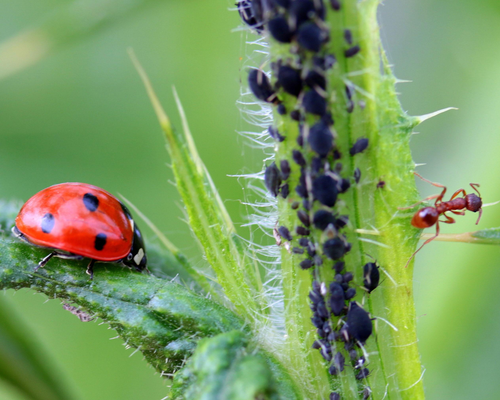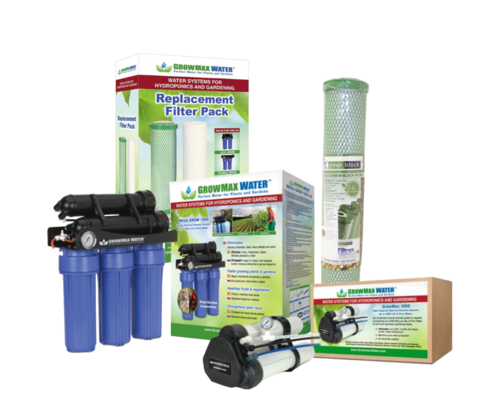What is the difference between biological control and control with pesticides?
There is a big difference between biological control and control with pesticides. Biological control is a way of controlling pests by using natural predators and parasites that live on the pests. This includes, for example, the use of predatory mites, parasitic wasps, lacewings, nematodes, etc. These methods are environmentally friendly because they do not use harmful chemicals. Instead, the natural processes of ecosystems are used to control pests.
Pesticides, on the other hand, are chemicals used to kill pests. Pesticides can be effective against pests, but they can also have negative effects on the environment and other beneficial organisms. Many pesticides are toxic and can pollute soil, water and air. In addition, pesticides can cause resistance in pests, making it more difficult to control them in the future.
In general, biological control is a better alternative to pesticides because it is more environmentally friendly and does not disrupt ecosystems. It is important to note that biological control sometimes takes longer to be effective than pesticides, and results vary depending on the specific situation.
What is biological control of insects?
Biological insect control is a method that uses natural means to control insects that can cause damage to crops, gardens and other green areas. The goal is to naturally control the population of these harmful insects without harming the environment and the health of people and other animals.
These techniques use natural enemies of insects, such as beneficial insects, microorganisms, plants, natural oils and natural substances, to limit the growth and spread of the harmful insects. Biological control is a sustainable solution that helps create a healthy and balanced environment for both plants and animals.
Biological control is an effective and environmentally friendly approach to insect control that protects the health of the environment and humans, unlike conventional methods that contain chemical pesticides and herbicides that can disrupt natural balances and be harmful to the environment and health.
What is the difference between preventive and corrective control?
Preventive and corrective control are two different designations for pest management. Preventive control focuses on preventing pests before they occur. This includes, for example, using biological methods, such as planting certain types of plants that attract predatory mites, or using certain types of compost that improve soil health. The idea behind preventive control is to create a healthy environment that is less susceptible to pests.
Corrective control focuses on controlling pests after they have reproduced. This includes, for example, using pesticides to kill pests, or manually removing infected leaves or stems. The idea behind corrective control is to control the pest as quickly as possible and prevent it from spreading further.
Both approaches have their own advantages and disadvantages, and it is important to consider which approach is best for the specific situation. Preventive control is more sustainable because it prevents future pest development, but it can sometimes take longer to see results. Corrective control is faster and more effective in terms of directly controlling pests, but it can disrupt ecosystems and pollute soil.
Can you take preventive measures against insects in a biological way?
It is possible to take preventive measures against insects in a biological way. Here are some of the most popular ways to perform preventive biological control:
- Healthy soil management: Healthy soil with plenty of soil life is less attractive to harmful insects, as beneficial insects, such as soil predators and fungi, limit the population of harmful insects.
- Planting diverse plant species: Diverse planting of plants in a garden or field increases the presence of beneficial insects and helps to balance the population of harmful insects.
- Healthy plant management: Healthy plants are better able to defend themselves against insects and pathogens, so it is important to provide proper care and nutrition to your plants.
- Attracting beneficial insects: You can attract beneficial insects by placing flowers and nectar-bearing plants in your garden, for example. These insects can reduce the population of harmful insects.
- Avoiding chemicals: Avoiding chemicals and pesticides is important in promoting a healthy environment for beneficial insects. In fact, chemical pesticides can also kill beneficial insects.
By using these and other preventative biological control methods, you can help limit the growth and spread of harmful insects and create a healthy and balanced environment for plants and animals.
What are biological pesticides?
Organic pesticides are products used to control insect pests and pathogens without using chemicals that can be harmful to the environment and human and animal health. Organic pesticides are organic because they are made from natural substances derived from plants, animals or minerals.
Organic pesticides work through natural methods, such as attracting beneficial insects or promoting natural processes, such as the growth of fungi or bacteria that control pests. They are usually less toxic than chemical pesticides and have fewer negative environmental and health impacts.
It is important to note that not all products sold as "organic" are actually organic. Therefore, it is important to carefully examine products sold as organic and verify that they meet the requirements for organic products.
What forms of biological control are there?
Insects can be a real pest in the garden and they can cause a lot of damage to plants and crops. Many people choose to use chemicals and pesticides to control these insects, but these chemicals can be harmful to human, animal and environmental health. Fortunately, there is a better alternative: biological insect control.
Biological insect control uses natural methods to control insects without endangering human health and the environment. These methods are often more effective than chemicals, and they are also much more sustainable. Below are some of the most popular biological methods of controlling insects:
- Companion Planting: Companion planting is a technique in which different types of plants are planted together to control insects. Some plants can repel insects and other plants can attract insects. For example, lavender and marigold can repel insects, while basil attracts insects that are harmful to other plants.
- Deployment of beneficial insects: Some insects can be used to control other insects. For example, aphids can be attacked by ladybugs and parasitic wasps. These beneficial insects are natural predators and they can be a great addition to your garden and they help you control insects organically.
- Neem oil: Neem oil is a natural oil that comes from the neem tree. It is an effective and natural way to control insects because it inhibits the growth of insects and their ability to lay eggs. Neem oil is also safe for beneficial insects and humans.
- Manual removal: Sometimes the best way to control insects is simply to remove them manually. This can be done by wiping them off or picking them away from your plants. It is important
What are beneficial insects?
Beneficial insects are insects that are useful in controlling other insects that are considered pests. Here are some examples of beneficial insects:
- Predatory bugs: Predatory bugs are beneficial insects used for biological control of pests. They are predators and eat eggs and young stages of pests such as aphids, spider mites and thrips.
- Predatory mites: Predatory mites are small, spider-like insects that can be useful for pest control. They are often used for biological control of spider mites, aphids and other pests that occur on plants.
- Parasitic wasps: Parasitic wasps are beneficial insects used for biological control of pests. They are predators and eat eggs and young stages of harmful insects, such as caterpillars and aphids.
- Nematodes: Nematodes are microscopic worm-like creatures used for biological pest control. They are parasites and live off the material remains of harmful insects, such as Sciarid Flies, caterpillars, aphids and beetles.
- Lace flies: Lacewings are insects used for biological control of pests. They are predators and eat the eggs and young stages of harmful insects, such as caterpillars and aphids.
It is important to protect beneficial insects and promote their presence by creating a healthy and diverse garden or field, and by avoiding the use of chemicals that can kill beneficial insects. As a result, beneficial insects can help control pests and promote a healthy and sustainable environment. There are other different types of beneficial insects against different types of pests available, on our website you can use a filter under biological control products to find the right product.
Do you want more information?
Want more information on a specific topic? Check our "Knowledge Center" blog page to see if the information you need is among them. Is the information not in one of our blogs? We have a piece of text with each category where the products are explained in broad terms. The most popular categories are:




